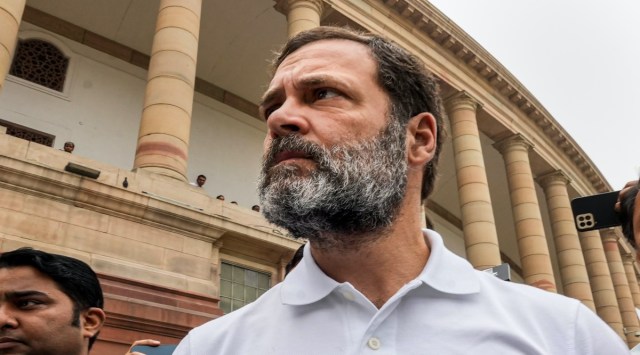Rahul convicted in defamation case, Congress scrambles to keep him in House
Court suspends sentence, gives him 30 days to file an appeal
 The Lok Sabha MP from Wayanad made the alleged remarks while addressing a rally at Kolar in Karnataka ahead of the 2019 Lok Sabha elections. (PTI)
The Lok Sabha MP from Wayanad made the alleged remarks while addressing a rally at Kolar in Karnataka ahead of the 2019 Lok Sabha elections. (PTI)
A Surat court Thursday convicted Congress leader Rahul Gandhi in a defamation case over his 2019 remark about thieves with the surname Modi, and sentenced him to two years in prison.
The court approved Gandhi’s bail on a surety of Rs 15,000 and suspended the sentence for 30 days to allow him to appeal.
Gandhi, who is MP from Wayanad in Kerala, can avert disqualification from Lok Sabha if an appellate court stays the conviction and suspends the jail term.
He was present in the courtroom when Chief Judicial Magistrate H H Verma held him guilty.
In his order, CJM Verma said the complainant — it was lodged by Purnesh Modi, BJP MLA from Surat West and a former Gujarat minister — “has proved his case without doubt” based on witness statements, documentary and electronic evidence.
The case against Gandhi was over his remark “Why do all thieves have the name Modi?”. He made the remark on April 13, 2019 during an election rally in Kolar in Karnataka.
In its order in Gujarati, the court observed that “the complaint was lodged not only because the ‘Modi’ community or people from the caste were defamed, but because the complainant (Purnesh Modi) himself was distressed. Moreover, the accused could have stopped at calling Shri Narendra Modi a thief (Shri Narendra Modi ne chor nu upnaam aapi ne) and equating him with economic offenders… like Nirav Modi, Lalit Modi, Mehul Choksi, Vijay Mallya. He could have limited the discussion to these people. But the accused intentionally insulted all those with the surname or name ‘Modi’ and said in his speech, ‘Why do all thieves have the name Modi?’.”
The court said the accused (Gandhi) had admitted many facts in the case in his statements and “if these facts are taken into account, then the accused has accepted the controversial facts”.
Handing out the punishment, the court said, “The Supreme Court had advised the accused to stay alert yet it does not appear as if it has made any difference in the conduct of the accused. Moreover, the accused is a Member of Parliament. And as MP, what he speaks before the public is taken seriously because when a person addresses the public as an MP, it has a larger impact and this makes the offence even more serious. If a milder punishment is handed out to the accused, then a wrong message will go to the public… the purpose of the defamation (law) would not be served and anyone would easily defame anyone,” it stated.
The case against Gandhi was lodged under IPC sections 499 (whoever, by words either spoken or intended to be read, or by signs or by visible representations, makes or publishes any imputation concerning any person intending to harm, or knowing or having reason to believe that such imputation will harm, the reputation of such person, is said to defame that person) and 500 (whoever defames another shall be punished with simple imprisonment for a term which may extend to two years, or with fine, or with both).
Defence lawyer Kirit Panwala, during arguments in the court, had said that the electronic evidence submitted to the court had not been proven as per provisions mentioned in the Indian Evidence Act.
The court, in its order, stated that “the present case is not only based on electronic evidence, but the statements given by witnesses and the documentary evidence has been clearly established”.
After conviction, when Gandhi was asked to say something, he said, “Whatever I spoke in my speech was in public interest and as part of my duty. I have not discriminated against any citizen. I love all the citizens of my country.”
Panwala told the court that the intention of the accused (Gandhi) was not to hurt any caste, and the complainant (Purnesh Modi) had not faced any damage by such statements and that the accused had not been convicted in any case prior to this case and had not sought any mercy or apology.
Prosecution lawyer Ketan Reshamwala urged the court that “the conduct of the accused should be taken into consideration”.
“The accused had apologised in writing before the Supreme Court in SLP No. 46/2018 and the apex court had advised him to remain alert in future. Yet the accused committed this offence… the accused is an MP and if he is given a milder punishment, then a wrong message will be sent out to the society,” Reshamwala said.
Panwala said, “We are not satisfied with the verdict passed by the court as some of our arguments were not taken into consideration. The issues we raised were (that) there is no community by the name of Modi and even the complainant is not a Modi as his earlier surname was Bhootwala and later changed to Modi. We will take up our issues to higher courts in the coming days.”
Reshamwala and Purnesh Modi said they were “satisfied with the court order”.
“I belong to the Modhwanik Ghanchi community which bears the Modi surname. The defamatory statements of Rahul Gandhi hurt our sentiments… and for that, we registered a complaint against him. Today, we are satisfied with the order passed by the court,” Purnesh Modi said.







